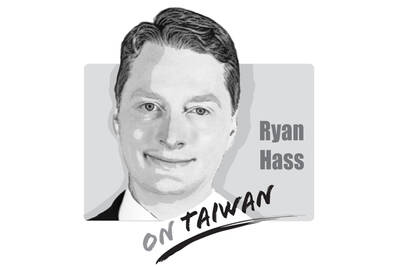Sales of the central bank's certificates of deposit have never been so crucial to the nation's banking system as they are now.
Recently this has become a key issue in draining excess liquidity from the banking system to help stem inflation.
Normally, the central bank has sold 30-day, 91-day and 182-day certificates of deposit and negotiable certificates of deposit (NCDs) each day from Monday to Friday to help control short-term liquidity on the local money market.
On July 11, the central bank absorbed NT$73 billion in one-year redeposits from four state-run banks to help reduce excess funds in the banking system, only a week after it sold NT$98.17 billion (US$2.99 billion) in 364-day certificates of deposit and NCDs on July 4.
Last Thursday, however, the bank announced unexpectedly that it would double the size of 364-day certificates of deposit and NCDs for Friday's auction to NT$100 billion.
In a statement issued later the same day, the bank hinted it might move forward the date of its quarterly board meeting to handle changing conditions, indicating possible interest rate hikes.
Raising interest rates again? Not a big surprise. Most economists and fund managers anticipated that the central bank would raise rates again during its board meeting in September to continue narrowing the gap between the nation's borrowing costs and those of other countries.
Hinting at an extraordinary board meeting to review the effectiveness of monetary tools shows that the central bank senses the pressure at a time when high fuel costs and prices of wholesale raw materials have sparked concern that the situation could deteriorate into overall inflation.
In theory, raising interest rates will curb inflation and support the value of the NT dollar. Without doing so, funds will be drawn to push up the prices of local real estate, stocks and other assets. But the government needs to do more on this front, other than raising interest rates and supporting local currency.
The government must carefully analyze the causes of today's price problems without panicking and implementing measures in haste.
The government should examine whether the problem is restricted to certain sectors or has expanded to affect the economy as a whole. It must also look into whether the situation is being fueled by rising price levels for manufactured goods or by surging demand for primary commodities such as oil, metals and grains.
Developing a viable solution for a price spiral requires a clear understanding of whether the problem is produced domestically or is the result of international factors such as an unstable world market and rising inflation in other countries.
If the problem can be traced to hoarding by importers, the Fair Trade Commission and other government agencies must take measures to punish them and prevent further hoarding and abnormal price fluctuations.
But if the problem is caused by instabilities in the global market, such as recent problems with grain commodities and crude oil, calling for the government to provide price subsidies will only ease growing public anger in the short term.
In the long run it will distort market mechanisms and hurt the economy.
Whatever measures the government takes, both it and the public should realize that there is no cure-all for a complex problem related to many local and international factors.

There has been much catastrophizing in Taiwan recently about America becoming more unreliable as a bulwark against Chinese pressure. Some of this has been sparked by debates in Washington about whether the United States should defend Taiwan in event of conflict. There also were understandable anxieties about whether President Trump would sacrifice Taiwan’s interests for a trade deal when he sat down with President Xi (習近平) in late October. On top of that, Taiwan’s opposition political leaders have sought to score political points by attacking the Lai (賴清德) administration for mishandling relations with the United States. Part of this budding anxiety
The diplomatic dispute between China and Japan over Japanese Prime Minister Sanae Takaichi’s comments in the Japanese Diet continues to escalate. In a letter to UN Secretary-General Antonio Guterres, China’s UN Ambassador Fu Cong (傅聰) wrote that, “if Japan dares to attempt an armed intervention in the cross-Strait situation, it would be an act of aggression.” There was no indication that Fu was aware of the irony implicit in the complaint. Until this point, Beijing had limited its remonstrations to diplomatic summonses and weaponization of economic levers, such as banning Japanese seafood imports, discouraging Chinese from traveling to Japan or issuing
On Nov. 8, newly elected Chinese Nationalist Party (KMT) Chairwoman Cheng Li-wun (鄭麗文) and Vice Chairman Chi Lin-len (季麟連) attended a memorial for White Terror era victims, during which convicted Chinese Communist Party (CCP) spies such as Wu Shi (吳石) were also honored. Cheng’s participation in the ceremony, which she said was part of her efforts to promote cross-strait reconciliation, has trapped herself and her party into the KMT’s dark past, and risks putting the party back on its old disastrous road. Wu, a lieutenant general who was the Ministry of National Defense’s deputy chief of the general staff, was recruited
Tokyo-Beijing relations have been rapidly deteriorating over the past two weeks as China tries to punish Japan over Japanese Prime Minister Sanae Takaichi’s remarks about Taiwan earlier this month, and the off-ramp to this conflict is yet to be seen. Takaichi saying that a “Taiwan contingency” could cause a “situation threatening Japan’s survival” — which would allow Japan to act in self-defense — has drawn Beijing’s ire and sparked retaliatory measures. Her remark did not gain public attention until Chinese Consul General in Osaka Xue Jian (薛劍) made an apparent threat to behead her. The two sides lodged protests against each